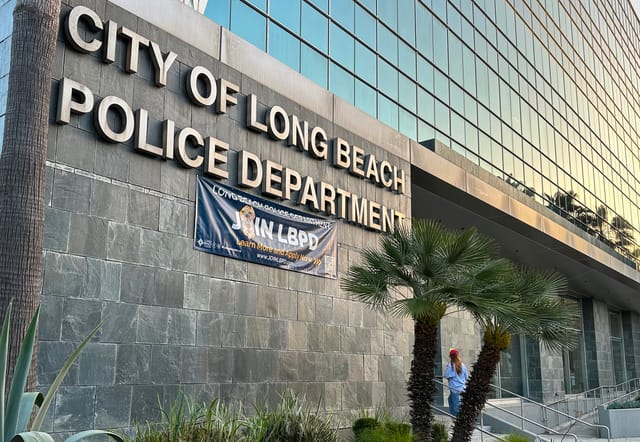Critically Speaking: Local news matters
That’s why we’re asking you to support us.

Nobody gets into news to make money.
Hell, I didn’t even get into it to cover the beat I’ve covered for the last decade.
But over the past 11 years I’ve learned that the City Hall beat is important, perhaps the most important for residents to understand why things are happening in our city, not just what. And I’ve taken a lot of pride in doing that job.
When I graduated from Cal State Long Beach and my friend asked me to help her out at this small local paper in Long Beach where she was the editor in chief, I quickly took her up on it. And when she asked me to start covering City Hall in 2013 I again said “yes” although I had no clue what that entailed.
Covering the city has sometimes meant sitting through meetings that run up to nine hours long and then coming home to finish writing a story about an important vote so you will know what happened the night before when you wake up.
But I do it because I know it’s an important job and our readers wake up seeking information and are trusting us to provide it. I also do it because no one else is.
Sure, you can get your national news from cable television or through larger outlets like the Los Angeles Times. But those outlets are rarely around to cover events happening in Long Beach, which is why local reporting is so vital.
We know this city, we live in this city and we care about it.
Those major outlets are also struggling. The Los Angeles Times laid off more than 100 people in January, and the Washington Post, which is owned by the second richest person in the world (Jeff Bezos) is still cutting reporters despite Bezos’ $214 billion fortune.
Local newsrooms are struggling, too. In fact, Long Beach’s local news organizations have long been in decline, with the once powerful Long Beach Press Telegram, which used to publish two papers per day, now having about the same number of reporters covering the city.
There’s also of course the situation at the Long Beach Post, which birthed The Watchdog and has now made our mostly volunteer newsroom the largest in the city.
A recent Pew Research poll showed that most Americans (63%) believe that their local newsrooms are doing very well or somewhat well financially, which might be why just 15% of respondents said they have paid or given money to a local news source in the past year.
The poll suggests that people trust local news more than national outlets with respondents believing that local news is reported accurately (71%), is transparent (63%) and that it keeps an eye on local political leaders (61%).
And 85% of respondents said that local news is at least somewhat important to the well-being of a community.
The Watchdog was founded as a co-op as all of us have survived newsrooms that were formed under a nonprofit banner or owned by a single wealthy person.
But our relationship has always been with our readers. I research and write stories to raise awareness of issues happening in the city and that’s why we’re asking the community to support our work.
We have a goal of reaching 1,000 paying subscribers by the end of the summer to help ensure that we can continue to do this important work for the community.
Subscriptions cost as little as $7.99 a month—a small price to pay to help keep the future of local news alive in Long Beach.
Please consider becoming a subscriber today.
What happened this week
The Long Beach Utilities Department recently absorbed the city’s gas operations after voters approved the merger in 2022 and now department officials are looking at a possible condensing of the department’s three campuses. The Utilities headquarters on Wardlow Road is not large enough to house all of its new employees and the department could look to a $210 million construction project that would create a new headquarters at its water treatment facility site near the Long Beach Airport. A vote on the project is not imminent as the Utilities board members want to have the department’s existing properties assessed to see how the possible sale or leasing of those sites could help reduce the projected $210 million price tag. The one-campus approach would also require negotiating a land swap with the airport and those conversations have yet to begin.
Something to keep an eye on
The Supreme Court of the United States has unleashed a flurry of huge decisions over the past month but the one that could end up affecting Long Beach the most was its ruling on whether states in the Western U.S. could enforce bans on sleeping in public. I wrote about this in April, but the basic backstory is that there was a law on the books that prohibited cities in western states from enforcing bans on public camping unless they had space in homeless shelters to house those people. The Supreme Court said this past week that the law is no longer valid and municipalities can now enforce bans on public camping. Long Beach officials never sent an amicus brief in support of the court striking down the law and Mayor Rex Richardson told The Watchdog that the city’s philosophy on addressing homelessness has not changed in light of the ruling. What is certain is that the political pressure being applied by residents asking for the city to do more can no longer be met with city officials pointing to the law that a majority of justices just struck down.
We need your support.
Subcribe to the Watchdog today.
The Long Beach Watchdog is owned by journalists, and paid for by readers like you. If independent, local reporting like the story you just read is important to you, support our work by becoming a subscriber.





